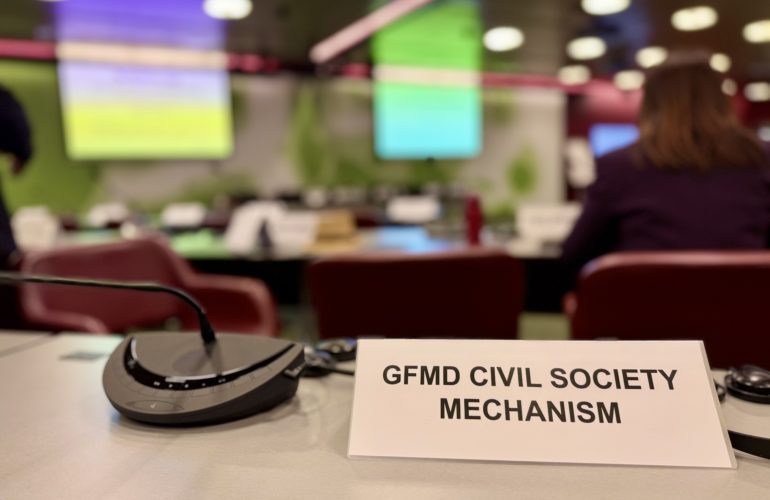Implementing the Global Compact for Migration: ICMC Advocates for Better Protection of Children and All Migrants
Nearly two years after States adopted the Global Compact for Migration, governments of Europe, North America, and Central Asia, under the auspices of the UN Economic Commission for Europe and the UN Network on Migration, reviewed the progress made towards its implementation. ICMC representatives advocated for the urgent adoption of measures to protect children, alternatives to detention, and access to essential services during the COVID-19 pandemic.

On 12-13 November 2020, the first regional review of the Global Compact for Safe, Orderly and Regular Migration (GCM) in the UN Economic Commission for Europe (UNECE) region took place online. The review’s goal is to help governments assess the progress made towards implementing the Global Compact for Migration. It aims to highlight opportunities, identify challenges and best practices, and establish regional priorities on which they can collaborate.
Panel speakers discussed the implementation of the GCM’s 23 objectives. Representatives of the UNECE Member States, NGOs, international organizations, local governments, academia, and the private sector participated in the proceedings.
Adapting Implementation To the COVID-19 Pandemic
ICMC Director of Policy Stéphane Jaquemet took part in the event’s closing panel along with Mr. Marco Mendicino, Minister of Immigration, Refugees and Citizenship Canada, Ms. Berta Nunes, Secretary of State of Portuguese Communities of Portugal, and Ms. Camilla Loli, Europe Focal Point for the UN Major Group on Children and Youth. Mr. Jonathan Prentice, Head of the UN Network on Migration Secretariat, moderated the panel.
During his intervention, Jaquemet proposed three implementing priorities for the Global Compact for Migration in the context of the COVID-19 pandemic.
“The first priority is to ensure that all migrants, regardless of their status, have access to services. In particular, [migrants should be able to access] health services – and I don’t need to explain why; education – it is extremely cruel at this very depressing moment to deprive migrant children of schooling; and social services,” said Jaquemet. He also stated the importance of implementing mechanisms that ensure that migrants’ access to essential services does not lead to their deportation or criminalization.
Secondly, said Jaquemet, we must prioritize the expansion of regular migration pathways. “We should never lose sight of the fact that the Global Compact, in its very title, is about ‘safe, orderly and regular’ migration. How can we then do justice to the title if regular pathways are not genuinely created and promoted, and the vast majority of would-be migrants cannot access them?”
The third priority identified by Jaquemet is the use of alternatives to migrant detention. To allow social distancing and reduce the risk of COVID-19 spreading among migrant populations and beyond, many governments have released migrants from detention centers during the pandemic. “We now have a solid body of best practices [on which] we can build an environment where alternatives to detention systematically prevail,” said Jaquemet. He also emphasized the need to immediately stop all forms of child detention.
Focus on Child Rights
In preparation for the regional review, informal consultations took place on Monday, 9 November. Non-governmental representatives took the floor to share their proposals and concerns, and governments were invited to listen in. ICMC Policy Officer Mantalin Kyrou shared a statement on behalf of the Initiative for Child Rights in the Global Compacts. The Initiative groups over 30 organizations, including NGOs, UN and philanthropic organizations, and trade unions. It aims to protect children and ensure that their rights are at the heart of the Global Compacts for Migration and on Refugees’ implementation.
In her presentation, Kyrou identified four priorities that UNECE Member States should adopt to ensure children’s protection.
The first recommendation is to always base a migratory decision on a child’s best interest. The Initiative for Child Rights recommends that social and child welfare services be included in determining a migrant child’s fate. Under current regulations, authorities can often return them to their country of origin if their asylum claim is rejected. The Initiative recommends that if children have been denied asylum, they should have the opportunity to apply for entry via other safe, regular pathways such as for education or family reunification.
The statement also calls for ending the practice of detaining any migrant under 18. Especially worrying, explained Kyrou, are new EU migration regulations in the draft EU Pact on Migration and Asylum that would allow authorities to detain migrant children between the ages of 12 and 18 for up to 10 months.
Thirdly, the Initiative calls on governments to facilitate family reunification by eliminating administrative barriers, short deadlines, onerous income requirements, and costly procedures to prove family ties, such as DNA testing.
Finally, the Initiative flagged the danger that COVID-19 denies migrant children the education and support they need. “Children’s education has been interrupted and we fear that some might not return, and that includes children who can’t access remote learning possibilities,” Kyrou stated.
Furthermore, violence and abuse of children have increased during the pandemic. “Mental health and psychosocial services and gender-based violence services need to be strong and include migrant children. Families and children should be able to access and benefit from COVID-19 response and recovery programs and measures without any discrimination based on residence or migration status. This includes facilitating enrolment in schools.”
Further topics discussed by NGOs and other actors during the preparatory meeting included violence and pushbacks at borders, migrant labor rights, and partnerships to promote migrant rights.
The UN Economic Commission for Europe is one of five regional commissions. Its territory spans 56 countries, including Europe, part of North America, Central Asia, the Caucasus, and Israel.
The Global Compact for Safe, Orderly and Regular Migration is a groundbreaking international agreement adopted by 152 States in December 2018. It aims to increase international collaboration on all aspects related to migration, including human rights, humanitarian needs, and development. A regional review of its implementation will take place every four years going forward.
The Global Compact for Migration’s text recognizes the Global Forum on Migration and Development (GFMD)’s role in its implementation. ICMC coordinates civil society activities in the GFMD.
- Read ICMC Director of Policy Stéphane Jaquemet’s statement during the review
- Read the Initiative for Child Rights in the Global Compact’s statement, delivered by ICMC Policy Officer Mantalin Kyrou during the review’s preparatory meetings.



